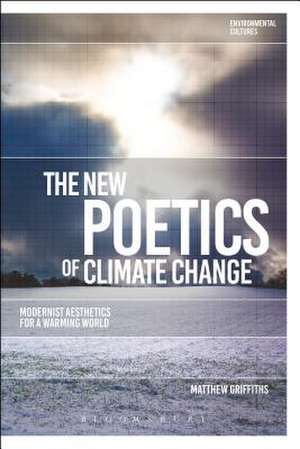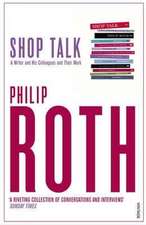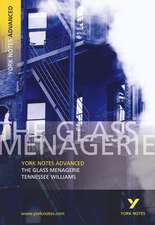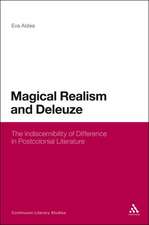The New Poetics of Climate Change: Modernist Aesthetics for a Warming World: Environmental Cultures
Autor Matthew Griffithsen Limba Engleză Paperback – 6 feb 2019
| Toate formatele și edițiile | Preț | Express |
|---|---|---|
| Paperback (1) | 230.24 lei 6-8 săpt. | |
| Bloomsbury Publishing – 6 feb 2019 | 230.24 lei 6-8 săpt. | |
| Hardback (1) | 714.77 lei 6-8 săpt. | |
| Bloomsbury Publishing – 26 iul 2017 | 714.77 lei 6-8 săpt. |
Din seria Environmental Cultures
- 23%
 Preț: 197.05 lei
Preț: 197.05 lei - 23%
 Preț: 191.13 lei
Preț: 191.13 lei - 23%
 Preț: 197.34 lei
Preț: 197.34 lei - 30%
 Preț: 508.70 lei
Preț: 508.70 lei - 22%
 Preț: 230.79 lei
Preț: 230.79 lei - 24%
 Preț: 196.36 lei
Preț: 196.36 lei - 7%
 Preț: 142.65 lei
Preț: 142.65 lei - 22%
 Preț: 128.11 lei
Preț: 128.11 lei - 30%
 Preț: 509.76 lei
Preț: 509.76 lei - 23%
 Preț: 190.68 lei
Preț: 190.68 lei - 30%
 Preț: 567.25 lei
Preț: 567.25 lei - 30%
 Preț: 569.06 lei
Preț: 569.06 lei - 22%
 Preț: 237.28 lei
Preț: 237.28 lei - 13%
 Preț: 230.03 lei
Preț: 230.03 lei - 23%
 Preț: 198.12 lei
Preț: 198.12 lei - 13%
 Preț: 229.24 lei
Preț: 229.24 lei - 23%
 Preț: 197.77 lei
Preț: 197.77 lei - 23%
 Preț: 198.05 lei
Preț: 198.05 lei - 24%
 Preț: 196.08 lei
Preț: 196.08 lei - 23%
 Preț: 198.82 lei
Preț: 198.82 lei - 30%
 Preț: 540.07 lei
Preț: 540.07 lei - 13%
 Preț: 238.58 lei
Preț: 238.58 lei - 30%
 Preț: 509.93 lei
Preț: 509.93 lei - 22%
 Preț: 225.59 lei
Preț: 225.59 lei - 23%
 Preț: 221.63 lei
Preț: 221.63 lei - 30%
 Preț: 773.81 lei
Preț: 773.81 lei - 22%
 Preț: 226.42 lei
Preț: 226.42 lei - 30%
 Preț: 509.93 lei
Preț: 509.93 lei - 23%
 Preț: 255.76 lei
Preț: 255.76 lei - 13%
 Preț: 239.32 lei
Preț: 239.32 lei - 22%
 Preț: 237.28 lei
Preț: 237.28 lei
Preț: 230.24 lei
Preț vechi: 296.79 lei
-22% Nou
Puncte Express: 345
Preț estimativ în valută:
44.06€ • 45.91$ • 36.48£
44.06€ • 45.91$ • 36.48£
Carte tipărită la comandă
Livrare economică 03-17 aprilie
Preluare comenzi: 021 569.72.76
Specificații
ISBN-13: 9781350099470
ISBN-10: 1350099473
Pagini: 224
Ilustrații: 1 b/w illustration
Dimensiuni: 156 x 234 x 11 mm
Greutate: 0.32 kg
Editura: Bloomsbury Publishing
Colecția Bloomsbury Academic
Seria Environmental Cultures
Locul publicării:London, United Kingdom
ISBN-10: 1350099473
Pagini: 224
Ilustrații: 1 b/w illustration
Dimensiuni: 156 x 234 x 11 mm
Greutate: 0.32 kg
Editura: Bloomsbury Publishing
Colecția Bloomsbury Academic
Seria Environmental Cultures
Locul publicării:London, United Kingdom
Caracteristici
Builds a new method of ecocritically reading modernist texts, including a case study reading of Eliot's The Waste Land
Notă biografică
Matthew Griffiths is a poet and literary critic.
Cuprins
1. Introduction: Climate Changes Everythingi. The Climate Change Poemii. Criticism and Climate Changeiii. Modernism Matters2. A New Climate for Modernismi. The Modes of Modernismii. The Changing Climate of The Waste Land3. Wallace Stevens's Fictions of Our Climatei. Some Poems of Our Climateii. Models for Atmospheric Apprenticesiii. Notes Towards a Climatic Poeticsiv. The Poetics of our Climate4. Basil Bunting and Nature's Discordi. Nature in Bunting's Romantic Modernismii. An Economy of the Elements, the Poetics of Entropyiii. Bunting Unboundiv. Mapping the Order5. David Jones's Anathemata and the Gratuitous Environmenti. Poetry versus Progressivismii. The Fractal Formiii. The Associative Anthropoceneiv. Contingent Culture6. The Poems of Our Climate Changei. Warming to the themeii. Sea Change: Modernist Poetics and Climate Change7. Conclusion: The New Poetics of Climate ChangeReferencesNotesIndex
Recenzii
The most exciting aspects of The New Poetics of Climate Change are its linking of climate change to texts that do not focus primarily on 'nature', and the comparison of lesser-known environmental poets with major canonical figures. Twenty-seventeen was the third warmest year on record; this book is uncannily topical.
Griffiths's beautifully written and clever book is full of provocations to think harder about the climate.
A challenging and thought-provoking work.
Matthew Griffiths offers some lucid and exciting reappraisals of Modernist poets, including some less often discussed (David Jones and Basil Bunting). He traces in these innovative texts the emergent forms of a global environmental ethic. Once fully recognised, the inventiveness of these modernist poets offers a gauge for the possibilities, limitations and strengths of climate change poetry in our own time.
A thoughtful and searching book which looks back as well as forward to think about the poems and poets of our climate. By exploring how Modernism and global warming disrupt our cherished conceptions of the world, Griffiths shows how poetic experiment and formal innovation can help articulate humanity's entanglements with its changing environment.
Griffiths's beautifully written and clever book is full of provocations to think harder about the climate.
A challenging and thought-provoking work.
Matthew Griffiths offers some lucid and exciting reappraisals of Modernist poets, including some less often discussed (David Jones and Basil Bunting). He traces in these innovative texts the emergent forms of a global environmental ethic. Once fully recognised, the inventiveness of these modernist poets offers a gauge for the possibilities, limitations and strengths of climate change poetry in our own time.
A thoughtful and searching book which looks back as well as forward to think about the poems and poets of our climate. By exploring how Modernism and global warming disrupt our cherished conceptions of the world, Griffiths shows how poetic experiment and formal innovation can help articulate humanity's entanglements with its changing environment.















